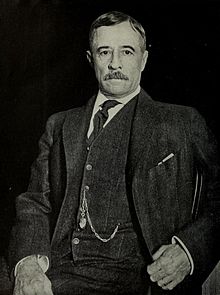John M. Parker
| John Milliken Parker, Sr. | |
|---|---|

John M. Parker
|
|
| 37th Governor of Louisiana | |
|
In office May 11, 1920 – May 13, 1924 |
|
| Lieutenant |
Hewitt Bouanchaud Delos R. Johnson |
| Preceded by | Ruffin Pleasant |
| Succeeded by | Henry L. Fuqua |
| Personal details | |
| Born |
John Milliken Parker March 16, 1863 Washington, Louisiana |
| Died | May 20, 1939 (aged 76) Pass Christian, Mississippi |
| Resting place | Metairie Cemetery |
| Political party |
Progressive (1912–1916) Democratic (1916–1939) |
| Spouse(s) | Cecile Airey Parker |
| Alma mater | Eastman Business College |
| Occupation | Businessman |
| Religion | Presbyterianism |
John Milliken Parker, Sr. (March 16, 1863 – May 20, 1939), was an American Democratic politician from Louisiana, who served as the state's 37th Governor from 1920 to 1924. He was a friend and admirer of U.S. President Theodore Roosevelt.
Parker was born in Washington, a village in St. Landry Parish, in south central Louisiana. He was educated at the historic prep school Chamberlain-Hunt Academy in Port Gibson, Mississippi, Belle View Academy, and Eastman Business College in Poughkeepsie, New York. A prominent businessman, he was the president of the New Orleans Cotton Exchange and the Board of Trade.
In 1891, Parker participated in the mob that lynched eleven Italian immigrants in New Orleans, avenging the murder of Police Chief David C. Hennessy. He refused to apologize for his role because he believed the mass lynching was justified.
Parker first ran for governor in 1916 as the nominee of Roosevelt's 1912 Progressive Party and polled 37.2 percent of the vote against the Democratic choice, Ruffin Golson Pleasant of Shreveport. Later in 1916, the national Progressive Party chose Parker as its candidate for vice president, but Roosevelt returned to the GOP fold and endorsed Charles Evans Hughes for president. The Democrats Woodrow Wilson and Thomas Marshall were nevertheless reelected to the presidency and vice presidency. Four years later, Parker returned to the Democratic fold, considered an essential move to win a Louisiana election at the time, and was elected governor with former opponent Pleasant's support. Louisiana governors were then term-limited after a single four-year term but could seek second terms after sitting out four years.
...
Wikipedia
